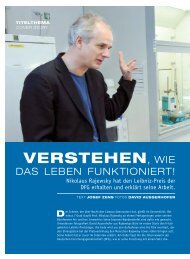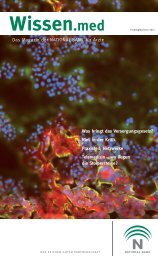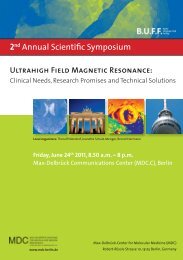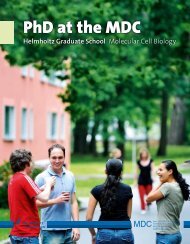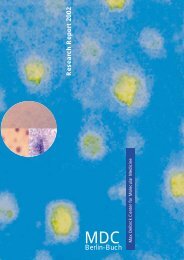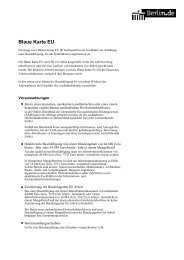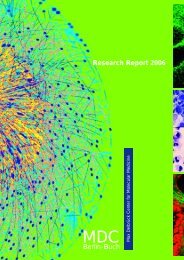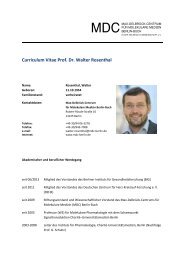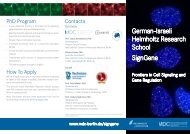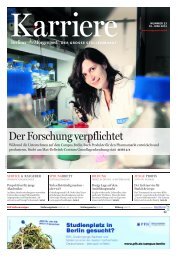Research Report 2010 - MDC
Research Report 2010 - MDC
Research Report 2010 - MDC
Create successful ePaper yourself
Turn your PDF publications into a flip-book with our unique Google optimized e-Paper software.
protein MACC1 as a marker for metastatic cells in colorectalcancer (CRC). MACC1 is involved in regulatinginjury response and tissue growth in the HGF/METsignaling pathway, which has been intensively studiedin Walter Birchmeier’s lab. The finding shouldallow doctors to assess the risk that CRC in a patientwill develop into a dangerous metastatic form, whichhas important implications in designing an effective,individualized treatment for the disease. Additionally,it establishes a mechanistic link between tumors anda crucial pathway involved in human development,contributing to our understanding of “cancer stemcells.”Yet another example of this type of interface is thelong-term collaboration of the labs of ClausScheidereit (<strong>MDC</strong>) and Bernd Dörken (Charité/<strong>MDC</strong>),along with the group of Martin Lipp and many othercolleagues. They have discovered many links betweenthe behavior of the transcription factor NF-kB and thedevelopment of Hodgkin’s disease and other lymphomas.Here, too, the findings are exposing mechanismsthat should result in improved diagnosis andtreatment for cancer patients.Another important step in carrying out our mission isto ensure that discoveries are capitalized on; to developa small-molecule inhibitor into a drug, for example,requires years of work and significant investments,and often the “ball is fumbled” in the handofffrom basic science to industry. Even a very importantfinding may require many further steps of developmentbefore it is at a state that it has become a basisfor founding a new company or before it attracts theinterest of the pharmaceutical industry. To smooththe way, the BMBF has sponsored a competitive programcalled Go-Bio, which provides several years ofsupport to academic groups to bridge the gapbetween a basic science discovery and commercialization.Since some promising projects are not quiteat a state to apply, the <strong>MDC</strong> has developed an internalstimulus program called “pre-Go-Bio,” to whichgroups can apply for three-year funding to prepare foran application within the Go-Bio program or withinanother program with a similar intention. In 2008two groups were awarded pre-Go-Bio grants; twomore received funding under the program in 2009.Im Labor von Thomas Jentsch werden die Funktion unddie Auswirkungen einer Fehlfunktion von Ionenkanälenund -transportern erforscht. Dabei entdeckten die Wissenschaftlermehrere Mutationen in bestimmtenIonenkanälen, die für Veränderungen in der Strukturdes Innenohrs verantwortlich sind und zu angeborenerTaubheit führen. Thomas Jentsch gehört gleichzeitig zuunserem Nachbarinstitut, dem Leibniz-Institut fürMolekulare Pharmakologie (FMP). Die Forschungsgruppewird von beiden Instituten jeweils zur Hälfte finanziert.Eine Besonderheit, die die enge Zusammenarbeitzwischen FMP und <strong>MDC</strong> illustriert.Ein wichtiges Anliegen des <strong>MDC</strong> ist und bleibt die engeInteraktion mit klinischen Gruppen der Charité. Die beiuns auf dem Campus Berlin-Buch gemeinsam mit derCharité entwickelten Schnittstellen zwischen klinischenGruppen und experimentell orientierten Grundlagenwissenschaftlernermöglicht nachhaltige Auswirkungenauf die Diagnostik und Behandlung von Krankheiten.In den vergangenen zwei Jahren hat der Charité-Kliniker Peter Schlag, der auch Leiter einer Arbeitsgruppeam <strong>MDC</strong> ist, im Zentrum von Berlin das sog. CharitéComprehensive Cancer Center aufgebaut. Dieses Zentrumermöglicht ein koordiniertes Herangehen andiagnostische, therapeutische, psycho- und sozialmedizinischeProbleme der Patienten. Im Rahmen ihrerexperimentell-wissenschaftlichen Arbeit am <strong>MDC</strong> hatdie Gruppe von P. Schlag in Zusammenarbeit mit WalterBirchmeier das Protein MACC1 identifiziert, das alsdiagnostischer Marker für Dickdarm- und Rektumkrebsverwendet werden könnte. MACC1 spielt im HFG/MET-Signalweg, der von Walter Birchmeiers Gruppe intensivuntersucht wird, eine wichtige Rolle und reguliertdadurch Gewebswachstum MACC1 und kann in der Klinikbei der Abschätzung des Risikos einer metatstatischenAusbreitung des Krebses wertvolle Informationenliefern, die in Zukunft möglicherweise eine gezielte,individuell angepasste Therapie ermöglicht. MACC1spielt möglicherweise auch eine Rolle bei der Entstehungsogenannter Krebsstammzellen.Ein weiteres Ergebnis dieser Art von interdisziplinärerForschung liefert die seit langem bestehende Zusammenarbeitder Forschungsgruppen von Claus Scheidereit(<strong>MDC</strong>) und Bernd Dörken (Charité/<strong>MDC</strong>) sowieder Gruppe von Martin Lipp (<strong>MDC</strong>) und weiteren Kollegen.Sie haben zahlreiche Bindeglieder zwischen demXII Director's introduction



